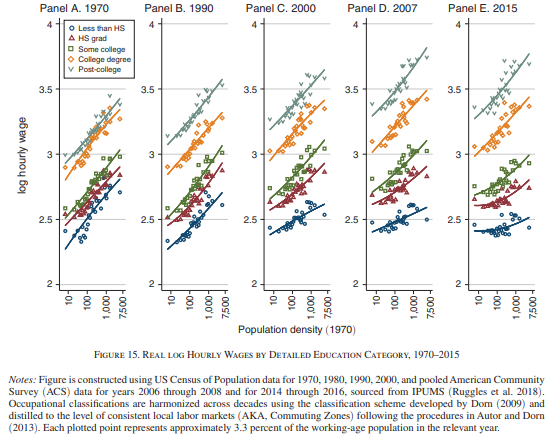Just finished reading @mattyglesias's take on superstar cities, remote work, and where college-educated professionals go next. Like with @Noahpinion's take, I've got some pushback/questions.
First off, I think some context is needed for why people even care about this. Lots of cities have been growing, not just the 6 superstars (Boston, NYC, DC, LA, Seattle, and SF), but the 6 superstars are *really* distinguished by their huge in-flows of college grads.
This gif illustrates just how *clustered* college grads have become in the US since 1970. It's one of the most stark long-run trends I've ever seen: https://twitter.com/imkahloon/status/1225884047647412225?s=20
(In case the link doesn't work, here's the gif again)
My pushback here: Matt's post leans heavily into the idea that the big problem with the Superstar Cities isn't that the nation's college-grads have become too heavily clustered in just a couple of places, but that these cities' housing policies aren't accommodating enough.
I'm all in favor of making their housing policies more accommodating. Look at my research output! Including the paper Matt cited on Wednesday morning, I've also done extensive writing on housing supply problems under rent control, particularly in SF. See: https://research.upjohn.org/cgi/viewcontent.cgi?article=1014&context=up_policybriefs
However, in other places in his writing, Matt talks at length about how the urbanized, college-educated bubbles that have formed in these same superstar cities produce bad politics. Why can't it be possible that they're also producing "bad" economics?
The basic idea is: if you had told an economist in 1970 that the US in 2020 would become even more educated, urbanized, and sorted *AND* growth and innovation would be underwhelming, they would be v surprised. I discuss this more in my other thread: https://twitter.com/basquith827/status/1354463023994437632
I enjoy @voxmediapods' The Weeds, but this is an issue where I wonder if the Enrico and Moretti (2018)-style insight is too in the weeds: housing markets are failing, but I don't think fixing housing would improve GDP as much as these papers claim.
E.g., Matt mentions in passing that more housing would allow more working-class folks to move to the superstars and get higher wages, but Autor (2019) shows pretty convincing evidence that the wages across cities for people w/o a BA has gotten pretty flat: https://www.aeaweb.org/articles?id=10.1257/pandp.20191110
In econ speak, there are not as many opportunities to arbitrage wages across regions as there used to be for non-BA workers, even under the status quo. I both believe that housing is a problem we need to fix AND the underlying sclerosis in the economy cannot be laid at its feet.
So my case for the "bad" economics effect of clustering is: economists like Ed Glaeser, Adam Jaffe, etc., have long championed the role of peer-effects in innovation. But at what point do peer-effects become groupthink?
If all the highest human capital folks are sorted into just a couple cities with just a couple of high-intensity social networks, then they seem just as likely to fall into groupthink as to learn useful insights from each other.
Taking a cue from Raj Chetty's profiles on innovators: if you come from a upper middle class background in the NE, go to Harvard, move to SF, then you might really think the biggest problem is not being able to get Chinese food delivered to your door at midnight.
It's what's bugging you and all of your friends, after all!
But if that same person were to land in Battle Creek or Flint in their 20's, they might develop very different ideas about what the biggest problems are that innovation could tackle. And maybe these ideas would tend to be more labor enhancing than labor replacing. Just a thought.
People forget, but lots of innovation and patenting was occurring outside of big cities for most of American history. @BitsyPerlman has some really cool research on this.
Next: Matt is (legitimately) worried that mass remote working might lead to further declines in the Rust Belt, as it has fewer lifestyle cities and thus prompt an especially severe exodus.
One answer is the same one I gave to @Noahpinion - all of these places have spent the past 20 years becoming more of a lifestyle city. None of them will ever be NYC (arts) or Florida (climate), but I know first-hand there's been greater cultural homogenization than is appreciated
Second, I think the "opportunity" side of the ledger is stronger than "threat", because a bunch of the people leaving the superstars might just move back to their home cities.
There are lots of people in the superstar cities who are from the Rust Belt, & some fraction of them are people who would love to live closer to family, but can't. I think there's a good chance that improved amenities + remote work might help bring some of them back.
Lastly, I think there's going to have to be greater interest in the case for place-based initiatives. My colleagues @TimBartik, @BHershbein, and @mmilleradams having been studying, as have others like @dannyyagan.
In a world with few opportunities for wage arbitrage, all time lows in worker mobility, and more complicated family arrangements, you can't keep setting policy assuming that the answer lies mostly in housing. You're going to have to bring jobs to where the people are.
See here for some excellent work by @TimBartik on the benefits for place-based policies: https://research.upjohn.org/up_workingpapers/308/

 Read on Twitter
Read on Twitter


